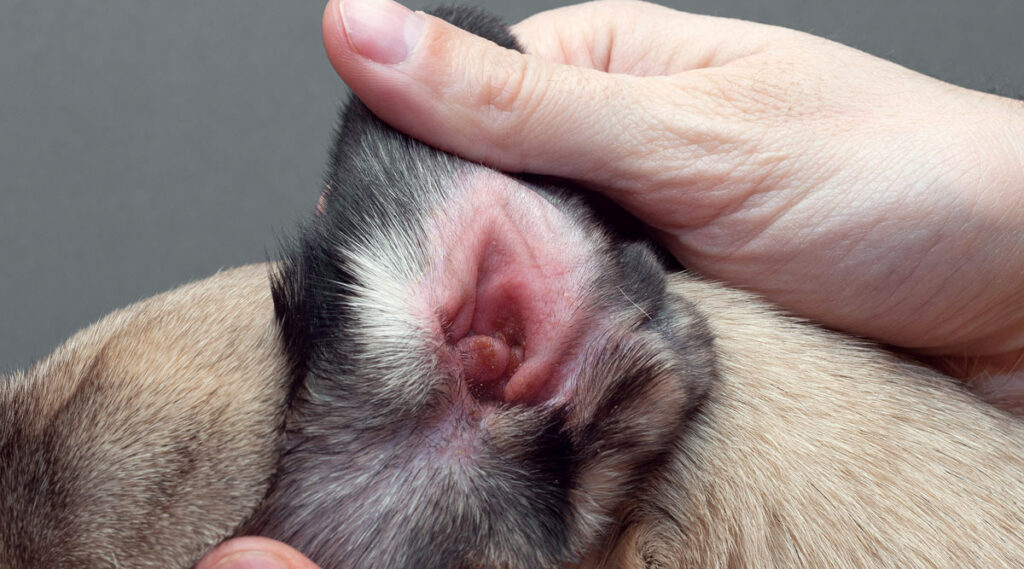Key Takeaways
- Dogs shake for various reasons. These range from feeling cold or wet, to more concerning issues like pain, illness, or anxiety.
- A quick “shake off” is often a sign that a dog is wet, but it can also be a way for dogs to relieve tension and stress.
- There are many potential medical causes of repeated or ongoing shaking. These include chronic joint conditions, dental disease, injury, neurological issues, poisoning, and ear infections.
- Not all shaking is a cause for concern. But persistent or unexplained shaking, especially when accompanied by other symptoms, warrants a visit to the vet.
Vets are often asked, “why is my dog shaking?” But before they can diagnose the problem, it’s important to understand that shaking can mean several different behaviors.
There’s “shaking off” when a dog is wet (see the picture above), which is an instinctive behavior to dry the coat or relieve stress. However, shivering or trembling may also be described as shaking, but these could be symptoms of a more serious health issue.
Whatever the type of shaking, it’s important to understand why your dog might shake and when it could indicate a problem. Here are six of the most common reasons for this behavior – along with tips for when to contact a vet.
Contents
6 Reasons Your Dog Might Be Shaking or Shivering
1. To Dry Their Coat

The most common reason for a dog shaking off is to dry his coat. And, despite how you may feel about your pet shaking off in your home, it’s very effective!
A dog can shake up to 70% of the water out of their fur, which is more efficient than towel drying.
Check out the video below if you want to see this in action:
Dogs also use this technique to shake off something stuck in their fur. If you see them shaking when dry, check for a burr or anything else sticky in their fur.
Note: There’s a big difference between the full body shake of your dog shaking water off, and the shivering or trembling that can indicate a more serious issue. If you’re unsure whether your dog is shaking off or trembling, contact a vet to be safe.
2. To Relieve Stress or Anxiety

The second most common cause of shaking in dogs is stress or nerves.
When a dog encounters a stressful situation, they often give a big shake-off to relieve tension and “reset.” This behavior, sometimes called an adrenaline flush, serves a similar purpose to humans taking a deep breath to calm their nerves.
While this type of shaking isn’t necessarily something to worry about, it’s important to address sources of stress in your dog’s life. Try to look for stress triggers, such as being crowded, hugged, or loud noises. For example, a dog that shakes off after being stroked may have found the interaction stressful.
However, dogs may also tremble when stressed or anxious about a situation. There is a big difference between shaking off and continuously trembling. If your pet is frequently shivering due to anxiety, this is more serious and should be discussed with your vet.
They may recommend one of the many anxiety medicines that are available for your furry friend. These mood stabilizers should be used as a last resort, but can help bring your dog down from their state of heightened alertness and fear.
“Some common examples I encounter are dogs who shake during thunderstorms and during fireworks, due to a noise phobia,” says Dr Linda Simon. “Do talk to your vet if noise anxiety is an issue for your dog, as there are techniques and medication available to help.”
Tip: Want to learn more about stress and how to recognize it? Click here for our complete guide to stress in dogs.

Separation Anxiety and Shaking: A Vet’s Perspective
“I’ve seen many cases of separation anxiety that present as shaking. Owners will notice the dog starts shaking when they are getting ready to leave the home, or they may spot the shaking on a pet camera while they are away.”
“These dogs don’t shake when they are relaxed and in the presence of their owner, so we know it is caused by anxiety. Frustratingly, separation anxiety is not always easy to treat, but most dogs will improve with the guidance of a canine behaviorist” – Dr Linda Simon, Veterinary Surgeon
3. Because They Are In Pain

A more serious cause of trembling is pain from injury or illness. This is a stress response that’s similar to anxiety, but has a more direct cause that you’ll need to address with your vet as soon as possible.
“Dogs tend to shake after a sudden increase in their pain,” says Dr Linda Simon, veterinary surgeon. “For example, if a dog jumps off a sofa and lands on a broken claw, this could trigger shaking. Shaking due to chronic pain (such as a sore tooth) is also more common at night, when the dog no longer has distractions from the discomfort.”
Pain in dogs has a variety of causes. It could be due to an acute injury, especially if your pet moves slowly or awkwardly. Ongoing conditions, such as arthritis, dental disease, or ear infections, can also cause chronic pain.
Dogs can’t tell us when they are in pain. They also instinctively hide pain, as in the wild, they would need to avoid being perceived as weak. So, dog owners need to be aware of the potential warning signs.
According to PetMd, there are three broad categories of symptoms when a dog is in pain:
- Changes to behavior – These symptoms could include avoiding people or a reluctance to being touched, restlessness, or aggression. Dogs in pain may also find it difficult to sleep and often lick the affected area excessively.
- Physical symptoms – These symptoms often include shaking, trembling, twitching muscles, a hunched posture, and panting.
- Mobility-related symptoms – If the dog’s pain affects their joints or muscles, they may limp or refuse to walk. Dogs in pain may also struggle to get up after lying down.
If you suspect your pet is in pain, you should always contact a vet to discuss potential causes and treatments.
4. Because They Are Cold

One of the most intuitive causes of shaking is a cold environment, as dogs shiver to warm up, just like humans. This is more common in short-haired breeds (such as Greyhounds), senior dogs, and puppies, but it can happen to any dog.
It’s rare for a healthy dog to get cold enough indoors to shiver, so if you notice your pet shivering, it’s probably time to turn up the heating. You may also want to try a heated dog bed.
Shivering outdoors is more common, especially if your dog’s coat gets wet, so dog jumpers can be vital during winter.
“Certain breeds, like sighthounds, lose heat more easily,” says vet Dr Linda Simon. “So, it’s not unusual for a Whippet or Italian Greyhound to shiver when outside in the winter. Make sure you cover them up with some doggy coats!”
While shaking due to cold is often easy to solve, it may also be a sign of a more serious endocrine issue, which we’ll discuss below.
5. Because of a Neurological or Endocrinological Issue
There are a number of neurological or endocrinological issues that may cause shaking in dogs.
Epilepsy is an issue that affects both humans and dogs, and can cause symptoms such as muscle twitching, shaking, or jerking. There are also diseases like Addison’s that lower adrenal output, which in turn causes a variety of symptoms such as muscle twitches, lethargy, depression, low blood pressure, and dehydration/excessive urination.
Other neurological issues can develop as your dog ages, particularly in larger dog breeds. You may see tremors or twitches in your dog’s limbs or facial muscles, which can be caused by the degradation of the nervous system, or something more serious like a tumor or spinal injury.
If your dog is shaking or trembling as he gets older, don’t dismiss it as a natural and unavoidable sign of aging. While this could be the case, your dog should be thoroughly examined by a vet to find the underlying cause.
6. Because of an Ear Infection (Head Shaking)

One of the tell-tale signs of a canine ear infection, apart from pawing at the ears, is shaking of the head. This often looks like your dog is trying to shake something out of the ear, rather than the full body shake associated with stress.
While a bacterial infection is a common cause of head shaking, it’s not the only possibility. Your dog may react similarly if there is debris stuck in the ear, or even if there is a growth within the ear canal. For this reason, you should contact your vet if you notice your dog head shaking.
Other Potential Causes of Shaking in Dogs
There are many other potential causes of shaking in dogs. These can include:
- Generalized Tremor Syndrome (“White Shaker Syndrome”). This is a condition that was first seen in white, small dogs, but has since been shown to occur in any dog. It causes chronic trembling, but can usually be treated with corticosteroids.
- Excitement. Some dogs get so excited that they start to shake from the adrenaline. This is more common in puppies, but some dogs never grow out of this behavior.
- Fear. Just like dogs shake when they get excited, the adrenaline associated with fear can also cause short-term trembling.
- Nausea. Dogs can feel nauseous for a variety of reasons, including illness, eating toxic food or motion sickness. Nausea can sometimes cause shaking, along with other symptoms such as vomiting, lack of appetite, and lip-smacking.
- Kidney Failure. A serious potential cause of shaking is chronic kidney failure. This can cause a variety of symptoms, such as weakness and excessive drinking. It’s a relatively uncommon condition, but is sometimes a side-effect of other diseases, such as cancer.
- Toxic Ingestion. Dogs can shake or shiver after ingesting toxins. Common examples include chocolate, mold, and certain types of house plants. Eating anything toxic is a medical emergency, so you should contact your vet immediately.
How Can You Spot Concerning Types of Tremors or Shivers in Dogs?

It’s normal for dogs to shake occasionally. This is particularly common when they are wet, cold, or during times of short-term stress (such as in the waiting room at a vet.)
“Shaking is a natural mechanism dogs use to dry off and keep warm,” says Dr Linda Simon. “It is beneficial for them to shake when cold or wet, as it helps them to get back to their ‘steady state’ and to feel more comfortable.”
However, normal shaking should resolve relatively quickly once the trigger disappears. “Vets are more concerned about shaking and shivering that occurs with no obvious cause,” says Dr Linda Simon. “Similarly, ongoing or frequent shaking is much more likely to be a concern.”
She adds that it can be useful to take a video of the shaking. This makes it easier for a vet to understand the behavior and determine whether it’s normal.
Vet Tip From Dr Linda Simon: “Dogs have also evolved to shake if they feel something on their fur that should not be there, like dust, bugs, mud, grass awns, or twigs. This helps to keep them clean, prevent infection, and reduce the chance of injuries.”
What Should You Do If Your Dog Is Shaking?

If your dog is shaking or shivering without an obvious explanation, then it’s important to take them for a vet checkup as soon as possible.
These behaviors can be a symptom of serious conditions, such as kidney disease, cancer, or injury, so your dog should be examined by a veterinary professional.
“As shaking can have many causes, it is not always easy for dog owners to know why it is happening,” says Dr Linda Simon, veterinary surgeon. “Vets have lots of experience with shaking dogs and diagnosing common conditions, which is important for getting the right treatment.”
Your vet will also understand which causes of shaking are most likely to affect a dog of your pet’s age and breed, which is vital for getting an accurate diagnosis.
“A disease like ‘White Shaker Syndrome’ is usually detected before a dog’s second birthday, while something like ‘Idiopathic Head Tremor Syndrome’ is usually seen in those aged about 1 to 4,” says Dr Simon. “Many other conditions that cause shaking, like canine dementia or arthritis, are more likely to be present in the senior population.”
It’s also important to take your dog to a vet if other symptoms accompany the shaking. These include the dog acting strangely, excessively panting, not eating, or vomiting. Lethargy is another warning sign that something isn’t right with your dog.

Poisoning And Shaking: A Vet’s Story
“One case that really sticks out to me was a young Labrador who presented at our emergency clinic drooling and shaking. The owner had no idea why this was happening and the dog had been acting normally an hour prior.”
“However, on further questioning, the owner realized that the dog had snaffled something off the path when on their evening walk. Given the signs, we suspected the dog may have eaten some moldy food. Fortunately, we caught it in time, and she was treated successfully for mold toxicity.”
“When the owner walked the same route the next day, she found lots of moldy bread crusts left by a bench her dog had been sniffing around!” – Dr Linda Simon, Veterinary Surgeon
Summary
There are many reasons why your dog could be shaking. Shaking off to relieve stress or dry their coat is normal behavior for a dog, but ongoing trembling or shivering can be a sign of something more worrying.
For this reason, you should always take your dog for a vet check-up if you notice they are shaking more than usual. An accurate diagnosis is essential for getting your dog the right treatment.
Do you have any questions about your dog shaking? Let us know in the comments below – although for medical questions, you should always contact a vet. You may also want to read our article “12 Reasons for a Dog’s Leg Shaking When Sitting.”

